by Jason Little
This is the story of Lean Change Management’s Jason Little, and how he became an accidental entrepreneur. It’s been four years since is first book was published, two since he started his lean change agent workshop program, and five since he decided to toss the over-used buzzword ‘agile’ into the toilet for a better way to achieve goals. Jason shares the milestones of how he accidentally became an entrepreneur.
June 25, 2013: I read a post on the now defunct Happy Melly Google Group about how Happy Melly Express would disrupt the publishing industry. A year earlier I had released Lean Change: Evolving Change Management on Leanpub and figured, what the heck, let’s give this a shot:

Vasco Duarte, fellow Happy Melly Funder, brand owner of Happy Melly Express, author of #NoEstimates, and host of Okisofy’s awesome Scrum Master podcast, is the producer for my book.
Happy Melly was born in the brain of Jurgen Appelo and the purpose evolved into a network of businesses and individuals who are dedicated, in some way, to helping people become happier at work. Happy Melly Express, the publishing company for my book, was the first Happy Melly brand designed to disrupt the publishing industry.
October 14: 2013: Vasco posted the details of the crowd-funding campaign and, shortly thereafter, Torsten Scheller bought the Godfather package! While The Godfather package didn’t include a commemorative horse head, it did include the ability to be part of the creation of a course based on the book.
The interesting part was, I had no intention of creating workshops when the first Leanpub version came out. The crowd-funding campaign was an experiment to find out what people were most interested in.
November 14, 2013: This was the day that the Lean Change Agent (cool name for our facilitators) became a reality. Torsten and I exchanged emails about what a course might look like, and he decided to schedule a couple of them in Munich.
As the Munich workshops approached, Torsten asked me about giving him the ability to run his own workshops, similar to Management 3.0.

The end result? I used one of Jurgen’s “8 Rules for Complexity” from Management 3.0: Steal and Tweak.
I applied the exact process he used with Management 3.0, but tweaked it to my liking. I offered more interaction with me, hangouts, new content, and support via a lean change LinkedIn community.
There you have it. A summary of what happened almost four years after a blog post I wrote about a conversation with a PMO director (project management office) and senior development manager that, in retrospect, was an utter disaster, I was on the path to help change agents of all disciplines discover more effective ways to facilitate organizational change.
I still remember that day vividly. The two hauled me into an office explaining how the project I was assigned to as their agile coach was important, and how they didn’t want ‘agile’ to get in the way.
If you’re not sitting, please do so.
I said:
“There are only four values, which ones should I break?”
Really, I said that.
And I didn’t get fired.
At that point, I realized all of this agile stuff had nothing to do with agile, and there had to be a better way to bring about change in an organization.
My first foray into applying change concepts came in 2010 when I was using A3 problem solving templates that I learned from Michael Sahota. We were working together in a medium-sized organization and created what would morph into change canvases by using a four-decades-old technique!
Back then, and still to this day, there is plenty of dissonance in the agile world. I spoke with someone at a conference recently who asked me ‘What the hell is wrong with the agile community?’ Each camp spends so much time belittling other camps, arguing over who’s right, what technique/method/framework/tool is the best, and trying to prove their right by attacking other camps.
So I figured I’d take the good things from various communities, methods, frameworks, and tools, and merge the agile, change, and organizational development communities.
I’m sure I have the email where I decided to join Happy Melly, but I do remember joining because the people involved were awesome! That was it. Anything Jurgen, Vasco, Sergey, and Lisette were part of, I wanted to be part of.
At this point, being a fifth wheel didn’t seem so bad!
This month marks the two-year anniversary of the Lean Change Agent workshops. Now I don’t have all the data because the awesome event management system Workshop Butler wasn’t built when I started running them, but here’s how many workshops that have been run so far:
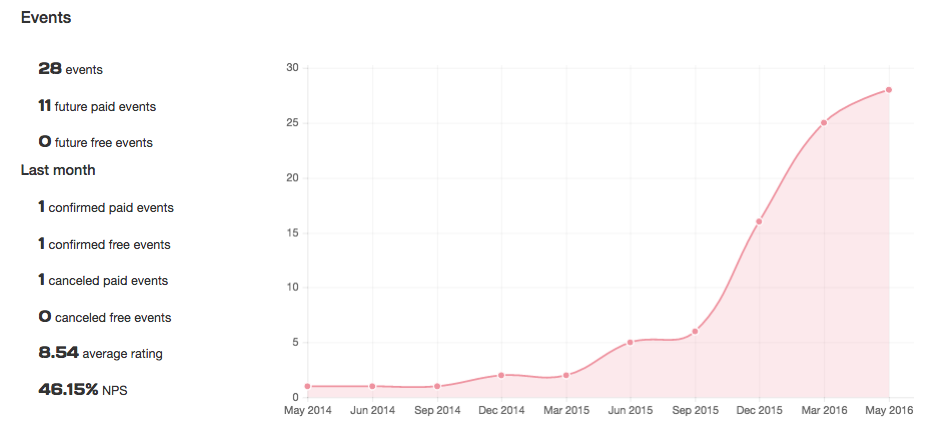
This is missing the first four or five that I ran, and all the workshops an un-named consulting firm runs because they won’t use Workshop Butler to promote their courses, so I guess I won’t promote them! (Sorry guys, re-read the licensing agreement!)
There are 23 facilitators worldwide:
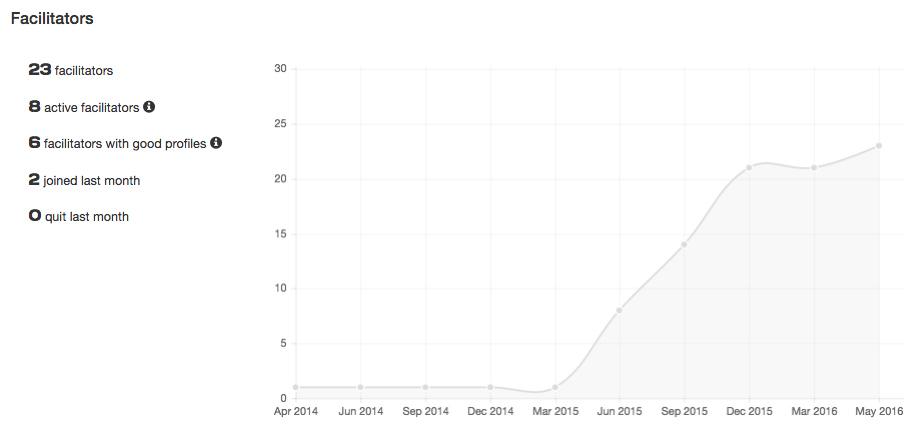
And people, other than me, are running events all over the world!
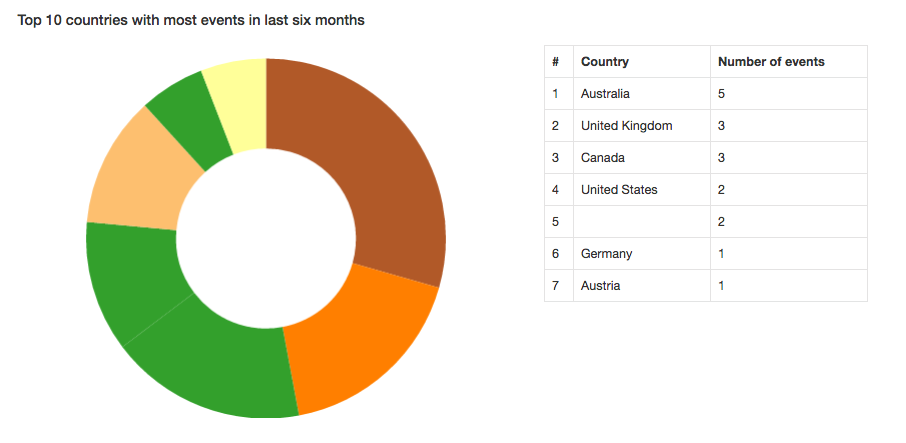
And we’re running them for these people:
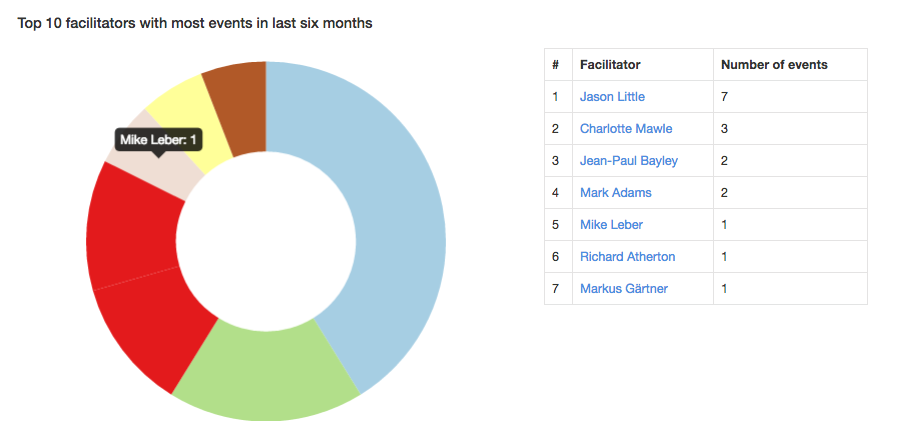
But what do people think?
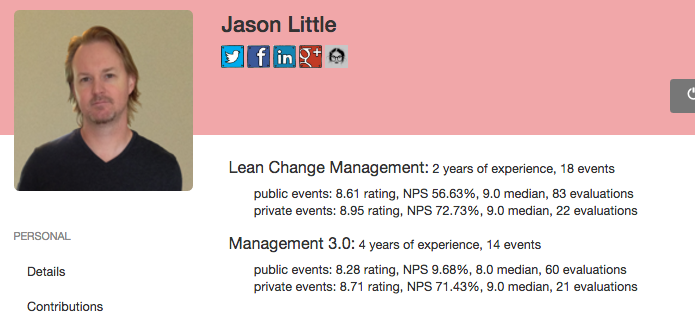
People who love the workshop tend to say things like this:
“Very knowledgeable, obviously has a wealth of experience in utilizing the tools and their different outcomes; Jason was really good at allowing the group to reach their own outcomes – he very effectively “facilitated” the learning instead of “taught” it. Way better than traditional courses!” – Toronto 2016, 10/10
“I have at least 3 experiments that I believe I could easily try as well some ideas around how to facilitate some conversations and get my current client to create some change canvases” – Toronto 2016, 10/10
“I appreciated Jason not giving a sales job of his method. He came across as genuine and very knowledgeable. He didn’t try to “cheerlead” us into using his methods, but took a very straightforward approach, sharing his successes and failures.” – Washington 2016, 10/10
But, people who don’t like the workshop say things like this:
“I am still struggling in terms of the action items. Overall, I was disappointed with the course and left more confused as to the overall objective of Lean Change Management. I kept waiting for it to come together and it didn’t. I do appreciate the tools that were shared and the concept of experiments/small change activities and the iterative nature of change. What I am trying to discern is the intended audience for the course and the focus of lean change management. I left feeling that the course is focused on an agile work environment and here are some change approaches and tools that could be applied in this environment. My initial interpretation from what I read on the Lean Change Management website and the course description was this: what is it about agile practices and methods that lend itself to a change management approach and why we should apply agile practices to change management. As well, I didn’t feel that the concept of “Lean” was well articulate and why this should be relevant.” – Toronto 2016, 3/10
Overall, and for all facilitators, the average rating is 8.54/10, and the Net Promoter Score is +46.
And how’s the book doing? So far, the book has climbed as high as #198 in Amazon’s leadership category, and 16,489 overall out of over 8 million books. (Not too shabby for a kid whose 11th grade English teacher told him he wouldn’t amount to much in the world of writing.)
The book is now available in German and the Spanish translation is on the way. My second and third books are in progress and I’ve achieved my objective of getting offered keynote speaking opportunities. Well, I did turn three of them down, but accepted a local one that’ll be announced soon!
Entrepreneurial lessons learned
Happy Melly asked me to write in this post about what entrepreneurial lessons I’ve learned, things I’ve tried and what it takes to be an entrepreneur. That was odd, because I don’t consider myself one. I simply do the things that make me happy. At Agile 2011 I was offered a book deal by Pearson Education, which eventually became a video series that launched their Live Lessons brand.
That made me wonder if I could write a book, so I did.
Then Happy Melly Express came along, and I emailed them out of the blue.
And that worked.
Then Torsten suggested a workshop.
I tried that, and it worked too!
I have a habit of hiring personal coaches. The last one I hired was the first professional career and executive coach I worked with. Many things have stuck with me, but perhaps the greatest lesson that stuck with me was when she said: “There are all of these threads of silver hanging right in front of you. All you need to know is which ones to tug on.”
I suppose I could spout a bunch of lean startup and lean experimentation mumbo-jumbo, but the truth is, I found my calling, and I just wasn’t smart enough to look so far down the road to think that I might fail.
Sure I ran experiments along the way, but I found my tribe, what I love, and kept my eyes open.
So yeah, I guess that’s what it means to be an entrepreneur.
The next steps on my reluctant entrepreneurial journey
My second book is in progress, but stalling a little due to client work, and another change facilitator guide is in the works with the help of a fellow facilitator, Ro Gorrell.
Perhaps my loftiest goal is creating a global change agent support network that helps people all over the world get unstuck with whatever change they’re working on. Sure, these exist today, but their purpose is creating standards, and are run like bureaucratic hierarchies.
Will it work? Who knows, but I’m sure going to give it a shot.
Have you been an accidental entrepreneur? Want to share your tale? Comment below or contact us so we can plan to tell that story too!


Jason, thanks for sharing your journey so far!
And so excellent of you to bravely include quotes from those “who don’t like the workshop…”